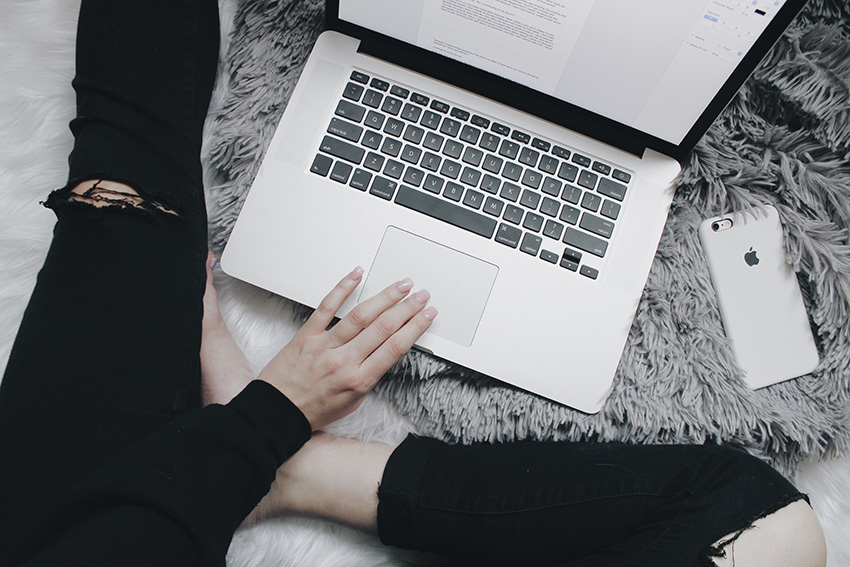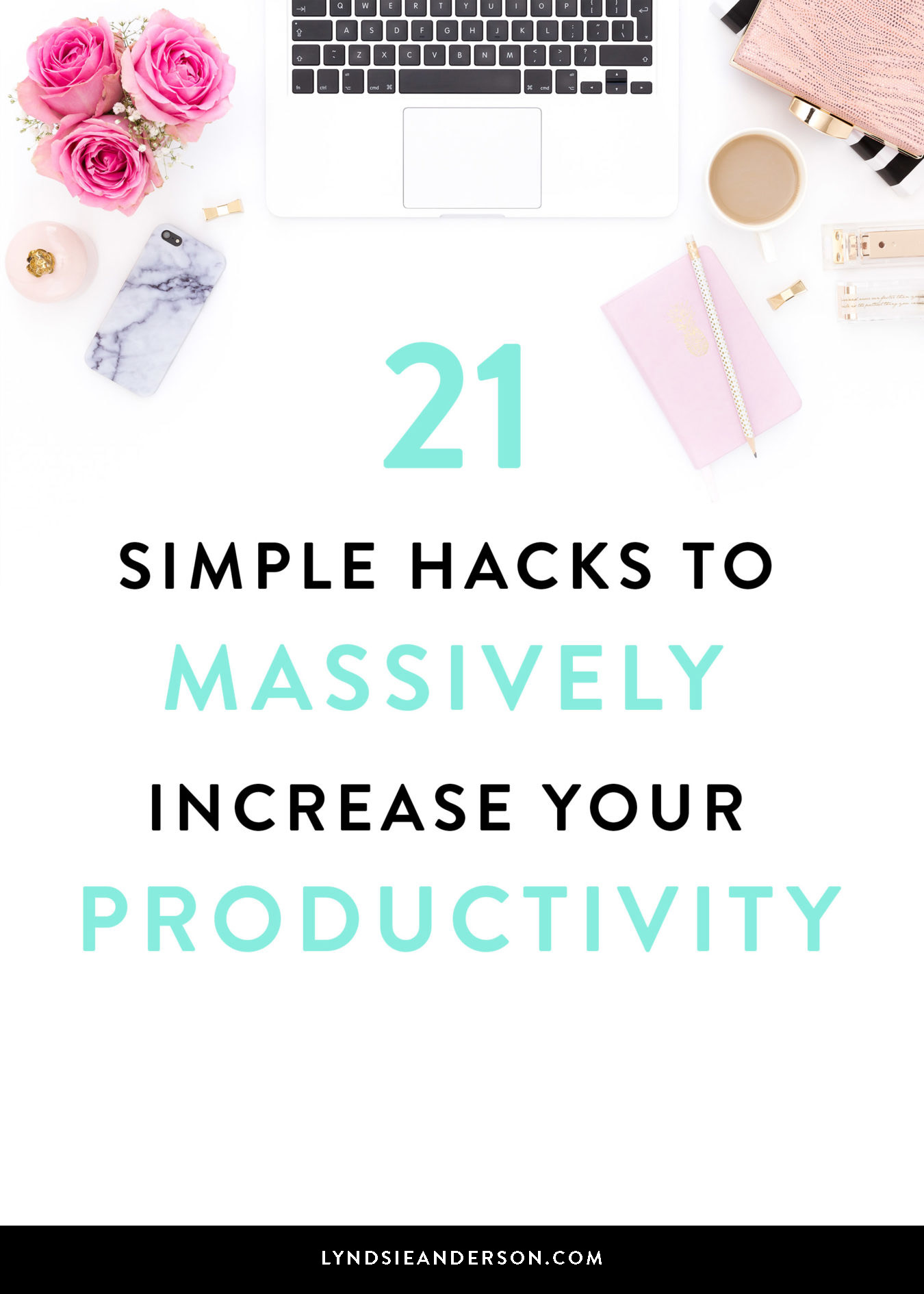
Do you ever feel like you’re always overwhelmingly busy, but without much to show for it at the end of the day?
I know I have!
The secret to overcoming your productivity woes is not necessarily to work harder (especially for many of us Type A personalities already putting in long hours and lots of effort).
Instead it’s time to start thinking about how you can work smarter.
To get you started, today I’m sharing 21 simple hacks to massively increase your productivity.
Tip #1: Always show up with intention
It sounds simple, but so many of us show up to work or the gym and think, “okay, I’m ready to be productive,” but once there, we realize we don’t really have a clear plan of where to start or what we actually intend to do.
Show up to your work session knowing exactly what you’re there to achieve.
Your intention should be results-oriented.
So, for example, if I’ve set aside 3 hours to work on my blog, my intention might be “Write 2 blog posts and create 4 corresponding Pinterest graphics.”
Give yourself something concrete to aim for.
Tip #2: Once you’ve decided on your goals… write them down!
Yes, I know, you’ve heard this a million times before, but that’s because it works! The research is plentiful.
One study conducted by Dr. Gail Matthews of Dominican University of California found that you become 42% more likely to achieve your goals, simply by writing them down on a regular basis.
I don’t know about you, but when it comes to achieving my goals, I’m all for easy ways to tip the odds in my favor. Try it!
Tip #3: Find someone to keep you accountable
Combine this with Tip #2 and you’ve improved your odds of actually accomplishing your goal enormously.
Dr. Matthews found that individuals who wrote down their goals and sent progress reports to their friends were 76.7% more likely to achieve them. C-R-A-Z-Y!
Your accountability partner could be a friend, a mastermind group, a coach, a mentor, or an online community.
The point is to make sure that somebody out there is holding you accountable to doing what you say you’re going to do.
This added social pressure to perform lights a fire under us that gets shit done. Use it to your advantage!
Tip #4: Apply the Pareto Principle to your to-do list
We often treat all tasks as equal when the reality is, that’s simply not true.
At the most basic level, the Pareto Principle (also known as the 80/20 rule and the Law of Vital Few) says that 20% of our efforts produce 80% of our results.
In order to determine what tasks are worth prioritizing, try this exercise suggested by Geoffrey James on Inc.com:
“When you make a to-do list, prioritize each item by the amount of effort required (1 to 10, with 1 being the least amount of effort) and the potential positive results (1 to 10, with 10 being the highest impact).
Now, divide the amount of effort by the potential results to get a “priority” ranking.
Do the items with the lowest resulting priority number first.”
So for example, in a given day I might need to…
- Write a blog post (Effort: 8, Result: 4, Priority: 2)
- Optimize website content for SEO (Effort: 10, Result: 2, Priority: 5)
- Write and send out a promotional email for my course launch that is happening tomorrow (Effort: 5, Result: 10, Priority: 0.5 )
Based on these numbers, I would choose to prioritize writing and sending my promo e-mail followed by writing a blog post and then optimizing my website content for SEO.
Tip #5: Awareness is key – Conduct a time audit
Research suggests that young adults use their smartphone roughly twice as much as they think they do, averaging five hours per day.
Similar studies have shown that we have a tendency to underestimate how much time we spend watching tv and surfing the web.
Before you can reclaim control of your time, you have to get real with yourself about where it’s all going now.
I recommend downloading the Google Chrome extension RescueTime to see where your time online is truly going and the app Moment to track how much screen time you are logging on your smartphone.
Additionally, whenever you find yourself off track, write down what it was that first distracted you so that you adjust your habits and environment to prevent it from happening as often in the future.
Tip #6: Create your “not-to-do” list
Perhaps just as important as the things we do do (lol) when we sit down to work are the things that we don’t.
Take some time to create a list of things that you won’t do when you sit down to get to work.
This could include things like not checking email before 10AM, not using social media until your most important task is done, or not taking calls from unrecognized phone numbers.
Tip #7: Embrace the power of “no”
Sometimes the issue is not that you need to work more effectively – it’s that you’re simply trying to do too much.
This is something I used to MAJORLY struggle with (and sometimes still do), but taking a few moments before committing to examine why you feel compelled to say “yes” to a request and how it will affect your other commitments can save you from a lot of regret later.
Before making a new commitment, take a moment to ask yourself:
- Will this task help bring me closer to my ultimate goal?
- What am I saying no to by saying “yes” to this request?
- Am I compelled to say yes to this because it is something I truly want to do or see value in, or am I just afraid to hurt someone’s feelings?
“A person’s success in life can usually be measured by the number of uncomfortable conversations he or she is willing to have.” – Tim Ferriss
Tip #8: Approach your work like a series of sprints – not a marathon
Doing in 8 hours what can be done in 4 with more efficient systems is not productive at all, yet it’s how most of us spend our 9-to-5 work days.
Instead it’s much better to organize your day as if it were a HIIT (High Intensity Interval Training) session at the gym, where you give short bursts of all out effort followed by a period of rest and recovery.
Try working in 90 minute blocks with breaks of 20-30 minutes in between.
The key is to make sure that your breaks are energizing and renewing, not even more draining than your work.
This means you need to stand up and MOVE, maybe eat a healthy snack to restore energy levels, have a conversation with a colleague or a call home to check in on the family, NOT leaving your computer screen to instead stare at your phone screen and browse social media or read the news.
Tip #9: Write down distracting thoughts
Why is it that when we finally sit down to work, we suddenly remember all of the things we forgot to do or get hit with tons of awesome ideas?
This used to happen to me ALL OF THE TIME and I’d find myself thinking “wellll I’ll just take 5 minutes to google this really quick” or “better just pay that bill now while I’m thinking about it so I don’t forget”. But this is a MAJOR PRODUCTIVITY KILLER.
The issue is simply ignoring these thoughts and ideas can be just as detrimental to your productivity as giving in to them.
A phenomenon called the Zeigarnik Effect demonstrates that we’re able to recall interrupted tasks 90% better than those we complete.
This suggests that the simple desire to complete a task can cause it to continue to take up valuable mental real estate until we complete it.
To solve this, I always start my work sessions with a blank sheet of paper on my desk that I call my “Thought Download” (You can also use the Notes app on your phone or computer).
Whenever a distracting thought or idea crosses my mind, I write it down to come back to later.
This keeps me from getting distracted in the moment, but also clears it from my mind because I know I’ll be able to return to it at a more appropriate time.
Tip #10: Keep your phone out of sight, out of mind
A study conducted at the University of Texas at Austin found that your cognitive capacity is significantly reduced whenever your smart phone is in reach – even if it’s off.
If possible, try keeping your phone in a different room than your office or work area.
This may not be possible depending on your work environment, so another – albeit less effective – option is to keep it hidden away in a bag or desk drawer.
Tip #11: Don’t watch the news in the morning (or at all)
News content is literally designed to be addictive.
You often end up spending way more time watching/reading than you originally intended just to learn a bunch of unuseful, irrelevant information (is what Kim K. wore to the beach really more important than your life goals?).
Additionally, the majority of the news is overwhelmingly NEGATIVE.
Studies have shown that the less negative TV we watch, specifically violent media, the happier we are.
If you’re going to perform at your best, you absolutely have to prioritize your mental state. Don’t sabotage yourself.
Now does this mean you have to waltz through life unconcerned and uninformed? Not necessarily. The point is to consume your news intentionally and from high quality sources.
In the past I’ve read email newsletters like theSkimm and the Quartz Daily Brief to get a bite-sized overview of what’s happening in the world.
Tip #12: Don’t check your email until your most important task is complete
Your email is essentially a stream of requests and other people’s priorities.
Before you get sucked into the black hole that is your inbox and make your day about everyone else, focus first on what is most important to you and your goals.
Tip #13: Ban all notifications
The entire point of a notification is to hijack your attention, so as a human attempting to be productive, why willingly opt in to that?
Turn off all notifications on your phone and computer – whether it’s email, social media, random apps, all of it needs to go.
If there are certain calls or messages you can’t miss, I still recommend keeping your phone on silent and scheduling regular breaks into your day to check and see if anything important has come in.
Tip #14: Schedule your social media time – don’t leave it open ended
A lot of us mindlessly default to scrolling our instagram feeds or seeing what’s going down on Facebook whenever we have a free moment or just feel like we need a break.
This is one of the fastest ways to derail your focus and concentration.
Instead of randomly turning to social media whenever an opportunity arises, consciously make it a part of your schedule (i.e. 1 hour from 7-8PM) and stick to it.
Tip #15: Make sure your workspace is clean and uncluttered
Research shows that clutter reduces your brain’s ability to concentrate and process information by overloading your senses, depleting your mental energy, impairing your ability to think creatively and leaving you feeling anxious, fatigued and overwhelmed.
In fact, after examining the relationship between 32 families and the objects in their homes, UCLA’s Center on Everyday Lives and Families (CELF) concluded that clutter has a strong effect on mood and self-esteem, particularly for women, whose amount of stress experienced at home was directly proportional to the amount of stuff that they and their family had accumulated.
Take a little extra time to keep it tidy and make your workspace work for you, not against you.
Tip #16: Keep water nearby
Your brain is 85% water and even mild dehydration – before it even registers as thirst – can result in things like difficulty concentrating, fuzzy short term memory, brain fog, fatigue, emotional instability, and headaches. Yikes!
The easiest solution? Keep a water bottle (the Hydro Flask is my go-to) with you to sip on throughout the day.
Tip #17: Focus less on managing your time and more on managing your energy
Most of us use our highest energy time – early morning – for answering email and other shallow tasks, and then try to get to our most important, cognitively demanding work later in the afternoon when our energy is lagging and we feel depleted. You see the problem here?
Do your most important work first thing in the morning, when your energy is at its peak.
Also recognize the value of rest for restoring your energy levels. Make sure that you’re scheduling short breaks in your workday for recovery.
Tip #18: Eliminate as many decisions as possible
Decision fatigue is the deterioration of our ability to make good decisions after a long session of decision making.
In other words, with each decision you make throughout the day, you become worse at weighing all of the options and making a well-informed choice.
In order to avoid this, try to eliminate as many decisions from your day as possible by planning ahead.
For example, you can:
- Plan and prepare your meals ahead of time
- Time-block your days
- Develop a set of “go-to” outfits so you don’t have to think about what to wear.
- Program your workouts for the week in advance.
- Schedule when you are going to check and respond to email
Tip #19: Quit Multitasking
“Multitasking is merely the opportunity to screw up more than one thing at a time.” – Steve Uzzell
In case you haven’t heard – multitasking doesn’t work.
Not only does it not work, in most cases it doesn’t exist – at least not in the way that we think it does.
Yes, people can actually do two or more things at once, such as walk and talk, but what we can’t do is focus on two things at once.
While you think you’re multitasking, what you’re actually doing is task-switching, and experts estimate that this can cause a 40% loss in productivity.
Our brains have a finite amount of attention. Constantly switching back and forth between several tasks wastes this precious limited resource because your attention is expended on the act of switching gears.
How do you minimize the effects of this? Try to group similar tasks together such as emails, returning phone calls, or scheduling social media posts so you reduce the amount of productivity wasted between switching from one type of task to another.
Tip #20: Create positive rituals and routines
The brain responds well to cues, so one of the best way to create “discipline” in your life is to do your most important daily tasks at the same time each day (i.e. working out, work sessions, when you STOP working, waking up and going to sleep).
It becomes automatic, instead of something that you have to waste brain power thinking about.
If your schedule doesn’t allow you to maintain consistent times for the daily tasks of your life, the next best option is to make sure that you have actually delegated a specific time and place for that thing to occur each day. Get it on the calendar!
Tip #21: Recognize your success at work has just as much (or more) to do with your behavior outside the office
A productive life is all about balancing your physical, emotional, mental, and spiritual energy.
If any of those areas suffer, it’s sure to impact the others, so it’s important to make maintaining your health a top priority.
Some of the ways you can/should do this include:
- Make sure you’re getting 7-8 hours of sleep per night. For some not getting enough sleep is like a badge of honor, a testament to what a hard-working individual they are. But ask yourself – is it really worth it to squeeze in that extra few hours of work late at night if it means that you’ve sabotaged your performance the entire next day?
- Fuel your body appropriately. PHYSICAL energy is the source that mental energy feeds off of. You can be the smartest, most capable person in the world, but without the proper fuel, you’re useless. So instead of cutting corners and eating junk when times get tough, double down on your efforts to make healthy choices (the easiest way to do this is to meal prep so that you aren’t stuck having to make food decisions in high stress situations).
- Look after your relationships. Many of us put work first at the expense of those most important to us (I’ve definitely been guilty of this one), but strong, loving relationships are one of the biggest sources of emotional energy renewal, as well as a top predictor of happiness and longevity.
- Don’t neglect your spiritual needs. You don’t have to be religious to be spiritual. Taking time to reconnect with your values and purpose each day is essential to living a fulfilling life. It’s what gives us meaning! This can take many forms – meditation, prayer, simply reflecting on your values, visualization, etc.
Now I want to hear from you!
What are your top tips for increasing productivity? What challenges do you find most often get in the way of your productivity? Let me know in the comments below!

If you found this post helpful, save it on Pinterest to come back to later!



Leave a Reply